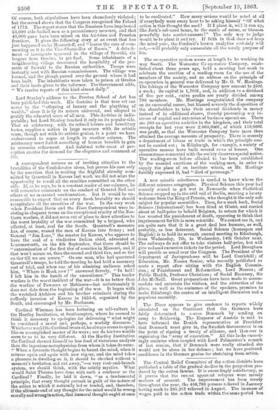Cardinal Wiseman has been lecturing on self-culture in the Hartley
Institution, at Southampton, where he seemed to think it necessary to apologize for delivering "what might be considered a moral and, perhaps, a worldly discourse." Whichever world the Cardinal treats of he always seems to speak like an accomplished master of its ways ; nor do his two worlds seem to us to be very different. At the Hartley Institution the cardinal showed himself no less fond of victorious analysis than the ingenious metaphysician from whom it takes its name. "When a favourite thought begins to haunt the mind, when it returns again and again with new vigour, and the mind takes a pleasure in dwelling on it, it should be checked without a moment's hesitation and cut away,"—a very root-and-branch system, we should think, with the saintly mystics. What would Saint Theresa have done with such a confessor as the Cardinal ? Finally, he laid it down, "as a fundamental principle, that every thought partook in guilt of the nature of the action to which it naturally led or tended, and, therefore, if the ultimate end of any thought for the mind would be wrong. morally andwronginaction, that immoral thought ought at once if everybody were every hour to be asking himself "Of what action is this thought the seed? If I plant it, wi:1 it run up, like Jack's coloured beans,, to the castle of crime, or blossom peacefully into scarlet-runners ?" Tha only way to judge would be to plant it and try. If faith in God does not keep the mind purr, the Cardinal's barren analytics certeinly will not,—will probably only emasculate all the manly purpose of life.






























 Previous page
Previous page